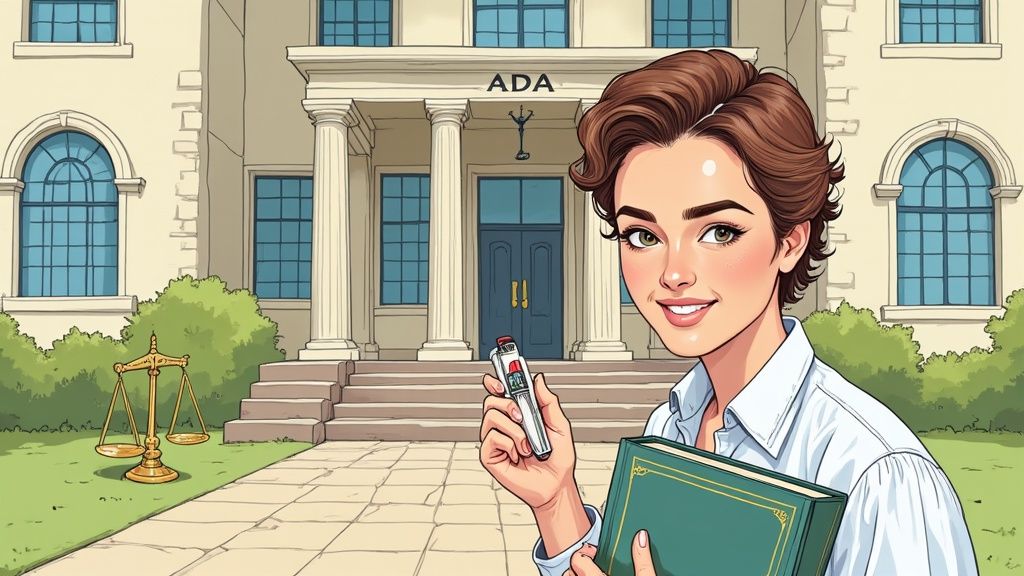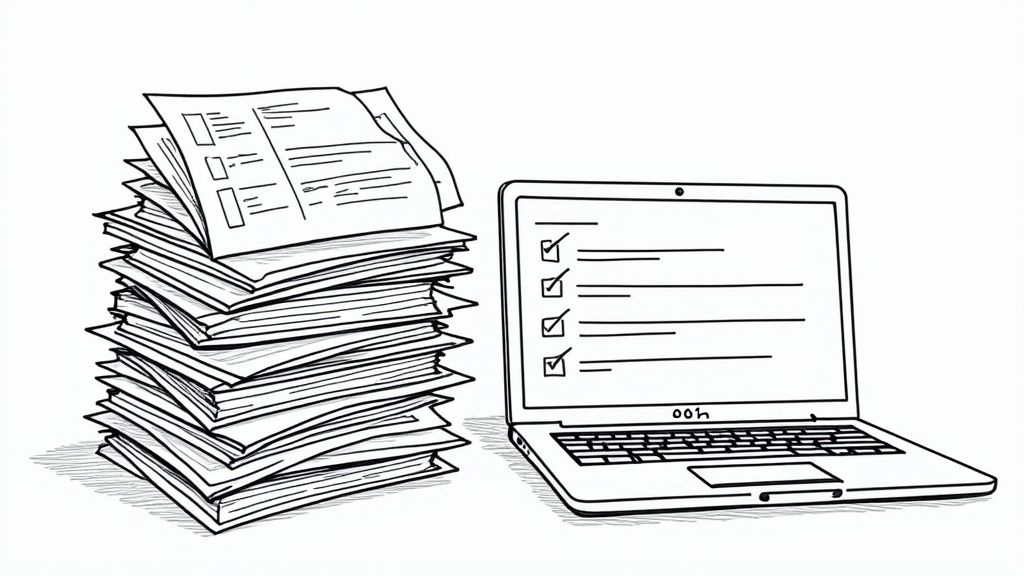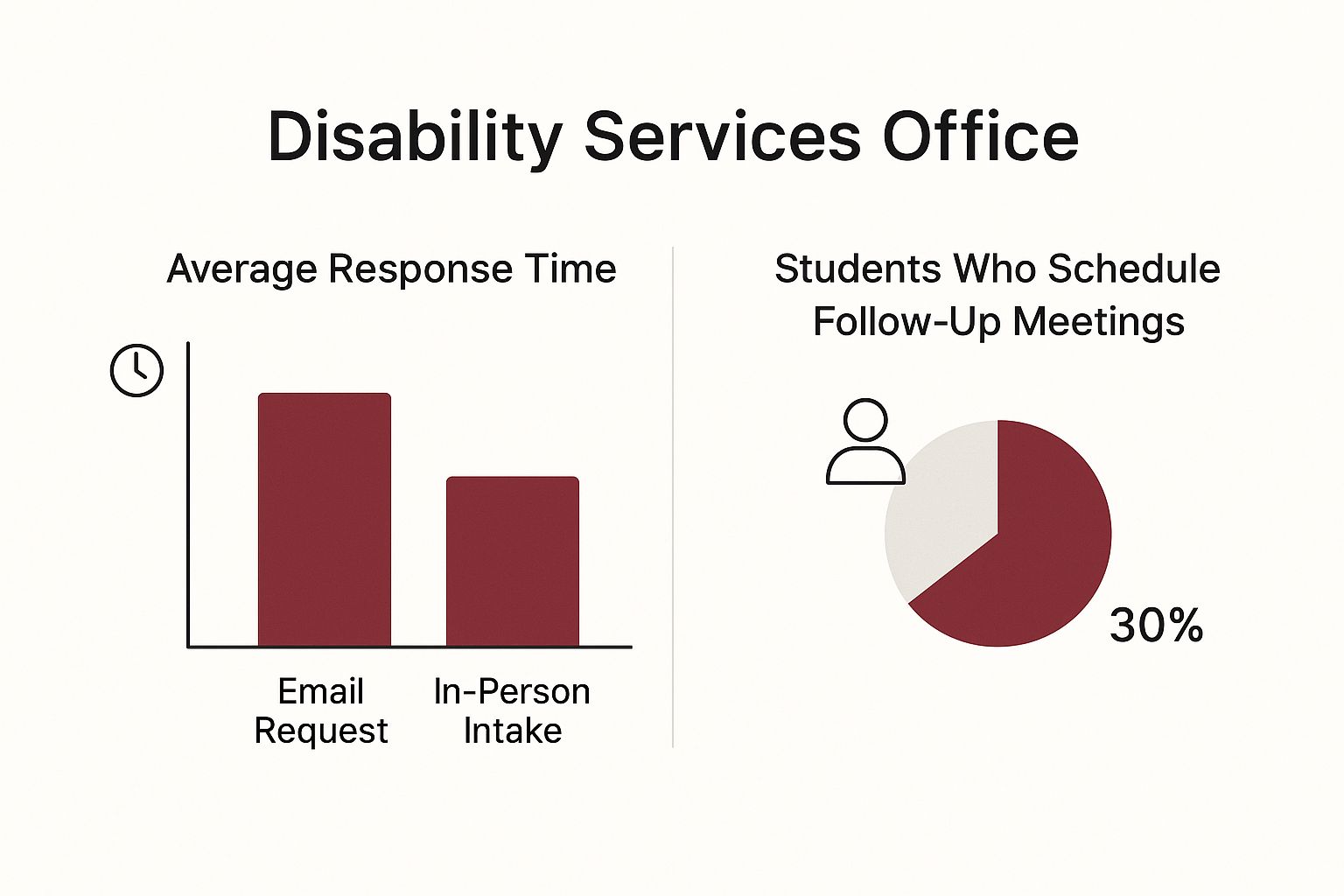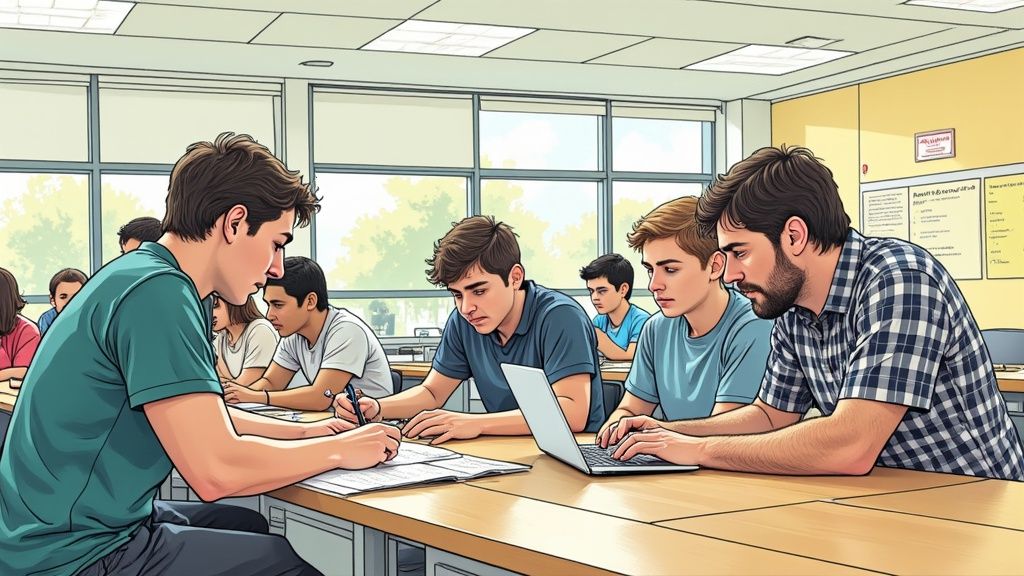When you hear "college disability accommodations," what comes to mind? It's not about getting a special advantage. Think of it as leveling the playing field so that every student has a fair shot at showing what they know and can do. These are simply support services and academic adjustments that give students with disabilities equal access to their education.
Understanding Your Rights in Higher Education

Heading off to college with a disability means you're stepping into a completely new legal world. In high school, you were likely covered by the Individuals with Disabilities Education Act (IDEA), which is all about ensuring student success through structured plans like an IEP. College is different. It operates under the Americans with Disabilities Act (ADA), and that's a crucial distinction to grasp.
The ADA is focused on providing equal access, not guaranteeing success. This shifts the responsibility squarely onto you, the student. You have to become your own best advocate and be proactive about getting the support you need. Your old high school IEP or 504 plan won’t just carry over—you have to kickstart the whole process yourself by contacting your college’s disability services office.
The Shift from IDEA to ADA
Moving from the IDEA framework to the ADA's model is probably the single biggest adjustment you'll make. In high school, the school district is legally required to identify students with disabilities and put a plan in place for them. In college, the tables are turned.
- You Must Self-Disclose: The college has no obligation to find you or figure out if you need help. You have to voluntarily share your disability with the right office to get the ball rolling.
- The Focus is on Access: Accommodations are all about removing barriers. This could look like getting extra time on exams, receiving course materials in an accessible format, or having a note-taker in class.
- The Responsibility is Yours: It's up to you to provide the necessary documentation, schedule meetings with disability advisors, and then communicate your approved accommodations to your professors each and every semester. Knowing how a 504 plan for ADHD worked in your high school years can give you a good starting point for the kinds of support you might want to ask for.
Overcoming the Hesitation to Disclose
Even though these supports exist, a surprising number of students never connect with their disability services office. This reluctance creates a huge gap between the students who need help and the help that's available.
According to the National Center for Education Statistics, only about 37% of college students with a disability actually report it to their school. That means a massive number of students are trying to get by without the tools that could make a real difference. The fear of being stigmatized is a major hurdle, especially for "invisible" disabilities like mental health conditions or learning differences. You can find more insights on students with disabilities in higher education from BestColleges.com.
Seeking college disability accommodations is an act of self-advocacy. It’s about equipping yourself with the necessary tools to demonstrate your knowledge and skills effectively, ensuring your disability doesn't become a barrier to your academic potential.
Ultimately, knowing your rights is the first, most powerful step you can take. It empowers you to build a successful college experience on your own terms and engage with the support systems that are there to help you thrive.
How to Document Your Accommodation Needs
If there's one thing that can make or break your request for college disability accommodations, it’s your documentation. Think of your paperwork as the bridge connecting your disability to the specific academic challenges you’re facing. It gives the disability services office the clear, concrete evidence they need to provide the right support.
Your cornerstone document is almost always going to be a diagnostic evaluation or a detailed letter from a qualified professional. This isn’t just a simple doctor’s note. It’s an official report that needs to clearly state your diagnosis, explain how it impacts major life activities (like learning, reading, or concentrating), and ideally, suggest specific, helpful accommodations.
Gathering the Right Paperwork
First things first, pull together all the existing documentation you have. This might come from a psychologist, medical doctor, psychiatrist, or another licensed specialist. The more recent and thorough the paperwork, the stronger your case will be.
A solid letter or report usually covers a few key things:
- A Clear Diagnosis: The document needs to explicitly name the diagnosed condition, whether it's ADHD, a specific learning disability, or a chronic health issue.
- Functional Limitations: This part is critical. It’s where your provider explains how your disability shows up in an academic setting. For example, it might describe how social anxiety makes it nearly impossible to participate in group presentations, or how dyslexia slows down your reading speed for timed exams.
- Suggested Accommodations: While the college always makes the final call, recommendations from your provider—like "extended time on exams" or "access to a note-taker"—carry a lot of weight.
If you’re just starting this journey or think you might have an undiagnosed condition, getting an adult learning disability assessment is the most important first step. A formal evaluation gives you the detailed, official evidence that disability offices are looking for.
What If Your Documentation Is Outdated?
It’s pretty common for students to show up to college with evaluations from middle school or early high school. While that's a great starting point, some universities have "recency" requirements, often asking for evaluations done within the last three to five years.
Don't panic if your reports are a bit old. The best move is to contact the disability services office at your college and ask about their specific guidelines. They might be fine with older documents supplemented by a current letter from your provider, or they may ask for a new evaluation. Just ask.
It's so important to remember you aren't alone in this. While colleges have historically leaned heavily on formal documentation, many students struggle to get it. A recent study actually found that nearly half of disabled students get to college without a diagnosis. This points to a huge systemic gap where students are missing out on support they’re entitled to. You can dig into the full report on the National Disability Center's website to learn more about these challenges.
Documenting Invisible Disabilities
Getting the right paperwork for conditions like mental health disorders, chronic pain, or ADHD can feel tricky because the barriers aren't always obvious to an outsider. The key is to have your provider clearly draw the line between your symptoms and your academic life.
For instance, a letter for a student with Crohn's disease might explain how unpredictable flare-ups make flexible attendance policies a necessity, not just a convenience. For a student with anxiety, a report could show why a quiet, separate testing room is the only way to fairly assess what they know. Your personal experience and your provider's professional expertise are the one-two punch that builds an undeniable case for the support you need to do your best work.
Partnering with Your Disability Services Office
Think of your college's disability services office as your most important ally on campus. They're not gatekeepers; they're your strategic partners, there to help you build an accessible and successful academic experience. Making that first connection might feel a little intimidating, but it's the critical first step to getting the support you need to thrive.
Most of the time, this process kicks off online. Check the disability services website for a dedicated student portal or an initial contact form. If you can't find one, a simple, professional email is the perfect way to get the ball rolling. Just clearly state your name, student ID, and that you’d like to register with their office to request accommodations.
Your First Meeting and What to Expect
After you reach out, you'll likely schedule an intake meeting. This is usually a one-on-one chat with a disability advisor. Try not to think of it as an interrogation—it's a collaborative conversation. Your job is to help them understand the specific barriers you face in an academic setting so they can match you with the right tools and supports.
To make the most of this meeting, it helps to do a little prep work:
- Get Specific About Your Challenges: Vague statements are hard to work with. Instead of saying, "I have trouble with tests," try something more concrete like, "The time pressure on multiple-choice exams makes it hard for me to fully process the questions, and my scores don't reflect what I know from untimed assignments."
- Have Your Documentation Ready: Make sure your diagnostic reports and letters are easily accessible, whether you need to upload them to a portal or share them during the meeting. It’s also a good idea to know what’s in them so you can point to key findings.
- Come with Questions: Don't be afraid to ask about logistics. Good questions include: "What's the process for sending my accommodation letters to professors each semester?" and "Who is my main point of contact if I run into any issues?"
Navigating Delays and Advocating for Yourself
It's a reality on many campuses: disability services offices are often swamped. They're working with limited staff and a growing number of students who need support. This isn't just a hunch—it's a well-documented trend. For instance, the Student Disability Access Center at the University of Virginia sent out a staggering 21,527 accommodation letters in 2023, all while dealing with staffing shortages. You can read more about these nationwide challenges in a detailed report on accommodation bottlenecks from The Chronicle of Higher Education.
So, what does this mean for you? A little patience and persistence are key.
This data gives you a helpful baseline. While that first meeting might happen pretty quickly, notice that a good chunk of students—30%—need to schedule follow-up meetings. This is completely normal.
Being a polite but persistent self-advocate is your most powerful tool. If you've submitted your documents and haven't heard back within a week or so, it's perfectly fine to send a friendly follow-up email. Your request is important, and making sure it doesn't get lost in a crowded inbox is a crucial part of owning your academic journey.
From the very beginning, focus on building a positive, professional relationship with your advisor. They are truly there to help, and when you approach it as a partnership, the entire process becomes smoother for everyone involved.
Exploring Common College Accommodations
So, your request was approved, and you have an accommodation letter from the disability services office. What happens next? It’s important to understand what these college accommodations look like in the real world, because they’re rarely just a generic list.
Knowing how these supports actually work helps you get the most out of them. For instance, "extended time on exams" doesn't mean you get an unlimited window to finish. It's almost always a specific multiplier, like 1.5x or 2x the standard time, and you’ll likely take the test at the college's dedicated testing center, not in the classroom with everyone else.
Academic and Testing Accommodations
Most of the accommodations students seek are tied to coursework and exams. These are designed to level the playing field, removing barriers that get in the way of you learning material and showing what you know. They don't change the curriculum, but they absolutely change how you engage with it.
Here are a few common ones you'll see:
- Note-Taking Assistance: This can come in a few different flavors. You might get access to a classmate’s notes through a volunteer system, get permission to use a smartpen that records audio as you write, or receive the professor's lecture slides before class.
- Accessible Course Materials: This is a game-changer if you have a visual impairment or a reading-based disability like dyslexia. The disability office can help get your required readings converted into formats like audiobooks, large print, or digital text that plays nicely with screen-reading software.
- Alternative Testing Environments: This is about more than just finding a quiet room. It’s a space with minimal distractions where you can focus without the anxiety that comes from being in a packed lecture hall during an exam.
The real goal of any accommodation is to make sure the test or assignment measures your grasp of the subject—not the impact of your disability. It's about creating an equitable shot for you to demonstrate what you've learned.
For students with specific learning differences, it's so important to know what tools are out there. Learning some practical strategies for managing ADHD can supplement your formal accommodations, giving you more control over your learning style.
Accommodations Beyond the Classroom
College isn't just about what happens in the lecture hall. Accommodations can also cover housing, dining, and other campus activities to ensure you have equal access to the full college experience. Honestly, these supports are just as crucial for feeling integrated and successful.
Housing accommodations, for example, could mean a single room to help manage a mental health condition, a ground-floor room if you have a mobility impairment, or a room with a private bathroom for a medical need. Dining services can also step up, working with students who have severe allergies or medically necessary dietary restrictions. You can learn more about how these supports are customized by exploring examples of academic accommodations for ADHD to see how they fit individual needs.
To give you a better idea of what's possible, the table below breaks down common supports you might find, organized by the type of disability they often address. Use this as a starting point to think about what might work for you.
Examples of College Accommodations by Disability Type
| Disability Category | Common Academic Accommodations | Common Housing & Campus Life Accommodations |
|---|---|---|
| Learning Disabilities (e.g., Dyslexia, Dyscalculia) | Extended exam time, text-to-speech software, note-taking assistance, audio recordings of lectures. | N/A (Typically focused on academics). |
| ADHD | Priority registration, reduced-distraction testing, permission to record lectures, deadline extensions. | Single-room housing to minimize distractions. |
| Mental Health Conditions (e.g., Anxiety, Depression) | Flexible attendance policies, extensions on assignments during flare-ups, pre-arranged breaks during long exams. | Single-room housing, emotional support animal (ESA) approval. |
| Physical/Mobility Impairments | Accessible classroom locations, specialized lab equipment, voice-to-text software for writing. | Accessible room (ground floor, roll-in shower), accessible campus transportation. |
| Chronic Health Conditions | Flexible attendance, adjusted deadlines, access to food/drink during class or exams. | Air-conditioned room, proximity to restrooms, special dietary plans. |
This isn't an exhaustive list, but it shows the range of possibilities. The key is to have an open conversation with the disability services office to find the combination of supports that will truly set you up for success.
Putting Your Accommodations into Practice
Getting your approved accommodation letter is a huge step, but it's not a magic wand. The real work—and the real benefit—starts when you put it to use. Think of it less as a finished product and more as the key that opens the door to a conversation.
The disability services office handles the official part, but you are the expert on your own experience. Your job is to connect the dots for your professors, showing them how those supports will play out in their specific classroom. Success here is all about clear communication and a little bit of self-advocacy.
How to Talk to Your Professors
Sending that first email can feel a bit awkward, but trust me, it’s a totally normal part of the college routine. Most professors are receptive and genuinely want to see you succeed. The key is to frame the conversation as a partnership.
Here’s how I recommend students handle it:
- Go early. Send your letter to each professor right at the beginning of the semester—ideally during the first week. You don't want to be scrambling the night before your first big exam.
- Offer to meet. In your email, suggest dropping by their office hours for a quick chat. This shows you're proactive and gives you a chance to talk through any specifics. For instance, you can figure out how "extended time" will work for their unique online quiz setup.
- Explain the why. You don't need to share your diagnosis, but it’s incredibly helpful to briefly explain how an accommodation helps you learn. You could say something like, "Getting the lecture slides ahead of time is a huge help for me. It lets me focus on what you're saying in class instead of just trying to frantically write everything down."
This kind of proactive approach really sets a positive, collaborative tone for the rest of the semester.
Your accommodation letter isn't just a notification; it's an invitation to collaborate. Approach conversations with professors as a partnership where you are working toward the shared goal of your academic success.
When Accommodations Aren't Working
Let's be realistic: sometimes an accommodation that looks perfect on paper doesn't quite pan out. Maybe the note-taker assigned to your class is unreliable, or an instructor forgets to adjust the timer on a quiz. This happens. It's not a sign of failure—it's a moment to practice your self-advocacy skills.
First, try addressing the issue directly and politely with the professor. Often, a simple, friendly email reminder is all it takes to fix a minor oversight. Something like: "Hi Professor, I just wanted to gently follow up on my accommodation for extended time for this Friday's quiz. Could you let me know how I should arrange that?"
If you’ve tried that and you're still not getting anywhere, it's time to loop in your disability services advisor. They are your official advocates. They can step in to talk with faculty, clarify requirements, and find a workable solution.
When you contact them, try to be specific. Documenting when and how an accommodation wasn't met gives them the concrete details they need to help you effectively. Learning to take ownership of your support system is a skill that will serve you long after you’ve graduated.
Common Questions About Accommodations
It's completely normal to have a lot of questions when you're figuring out college disability accommodations. The whole process can feel a little murky at first, but getting answers to a few common concerns can give you the clarity you need to move forward with confidence.
Let's clear up some of the most frequent points of confusion.
High School Plans vs. College Accommodations
One of the biggest hurdles is understanding how different college is from high school. In high school, you were likely covered by the Individuals with Disabilities Education Act (IDEA), which puts the school in charge of identifying your needs and ensuring your success, often through an IEP or 504 plan.
College is a whole new ballgame. It operates under the Americans with Disabilities Act (ADA), which is all about providing equal access, not guaranteeing success. This is a huge shift. It means your high school plan doesn't just roll over automatically. The responsibility is now on you to proactively contact the disability services office and advocate for yourself.
Can I Get Support for a Temporary Injury?
Absolutely. Colleges don't just support permanent disabilities. They also provide temporary accommodations for short-term issues like a broken arm that makes note-taking impossible or a concussion that affects your focus. These supports are designed to keep you from falling behind while you heal.
The process is usually pretty straightforward. You'll likely just need a doctor's note explaining the injury, how long it's expected to last, and how it impacts your ability to do your coursework. The key is to reach out to the disability services office as soon as you can after the injury happens.
Don't ever think a temporary condition isn't "serious enough" for support. Things like getting extra time on an exam, being granted an excused absence, or even getting help with campus transportation can make a world of difference in your recovery and your grades. It's always worth asking what's available.
Will My Disability Status Appear on My Transcript?
This is a big one, and the answer is a firm no. Your disability status, the fact that you use accommodations, and any interaction you have with the disability services office are all completely confidential. This information is protected by federal privacy laws like FERPA (Family Educational Rights and Privacy Act).
It will never show up on your transcript, your diploma, or any other official school record. This information is shared strictly on a need-to-know basis. Usually, the only people who know are you, your disability advisor, and the professors who need to know to implement your accommodations in their specific classes. Your privacy is taken very seriously.
If you're looking for clarity on your own neurodiversity or need official documentation for academic accommodations, Sachs Center can help. Our virtual diagnostic evaluations and neuropsychological testing provide the formal reports needed to secure support. Book an evaluation with our specialists today.


